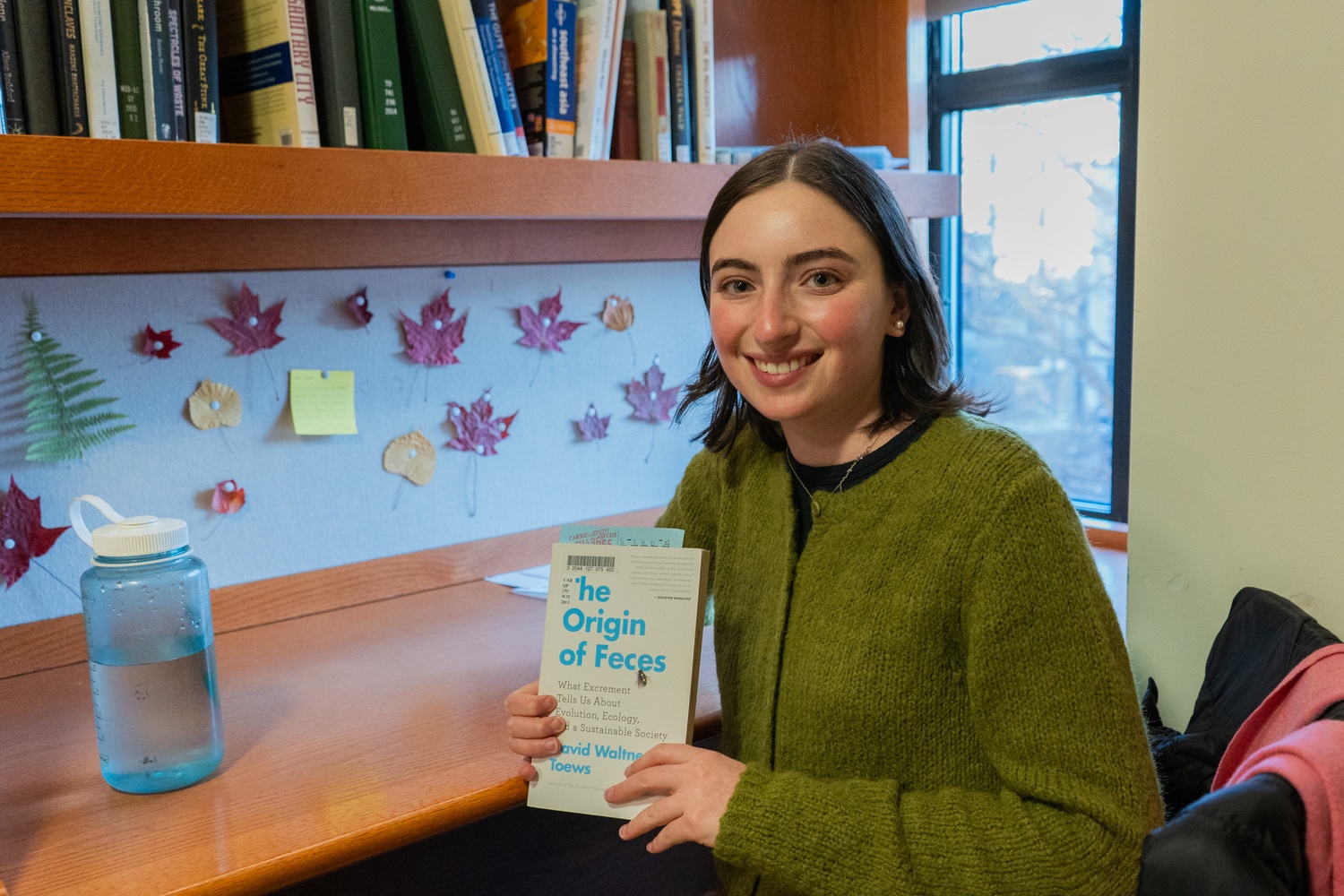
Most Interesting Thesis: Sabrina Freidus
When I first met Sabrina M. Freidus ’25, I was struck by her composure — she’s calm, cool, and collected. If I didn’t know any better, I would have been surprised to hear that she’s writing her senior thesis on pooping and the history of toilets.
“It’s kind of strange to talk about poop in an academic context, but it’s gone well so far,” she says. “No one has laughed, and everyone has taken it seriously, so that’s really nice.”
Sabrina has been “interested in waste” ever since she lived in an ecovillage a few years ago. For a month, she used a composting toilet. On the door, someone had painted “Thank you for your contribution.”
“I think it’s really interesting that human waste could be treated as a resource, but here, we treat it as something that you need to be as far away from as possible,” she says.
Ironically, Sabrina got the idea for her thesis from a joke her friend made. “One of my friends was like, ‘Sabrina, you should write your thesis about toilets or about poop.’ And I was like, ‘I will.’ And that’s what I ended up choosing.”
Toilets, it turns out, have a colonial history.
When Sabrina took History of Science 100: “Knowing the World,” a required introduction survey course for all concentrators, she was required to read a chapter from Warwick Anderson’s “Colonial Pathologies.”
“After germ theory had become the dominant medical idea, people from the United States went to the Philippines and were shocked,” Sabrina says. “They had this idea that there was no separation between the body of the Filipino person and the outdoors.”
“They kind of turned the Philippines into a laboratory and would collect fecal samples and use sanitation as a justification to colonize,” Sabrina says. She later adds a caveat: “Germ theory is really important, and we wouldn’t be where we are today without it. I think it’s the way science is used that can sometimes be concerning.”
When Sabrina studied abroad in Nepal, she saw these same Western misconceptions play out today in the ways tourists talk about squat toilets. “You could just overhear tourists saying, ‘Oh, this restaurant is nice. It’s safe to eat there, they have a real toilet.’ Or, ‘Don’t eat at this restaurant, it has a squat toilet,’” she recounts.
While she was in Kathmandu, Nepal, Sabrina saw many toilet stores proudly displaying “Western”-style porcelain thrones for sale in their front windows. “I thought it was this interesting association between wealth and modernization, globalization, and sitting instead of squatting,” she says.
Paradoxically, squat toilets are, in some ways, more sanitary than sitting toilets, which doctors have known for some time. When your body is in contact with the surface of the toilet, you’re at greater risk of sanitary issues and infections, Sabrina points out. “The other problem is that the position when you’re sitting is less sound biologically because when you squat, your muscles are aligned in a way that makes it easier to poop,” she adds.
She says there’s a personal angle, too. “I was a constipated child and had to take MiraLAX every day for many years of my life,” she says. “These doctors knew that there was a constipation problem, and changing the structure of toilets could have helped, and no one did anything about it.”
Since she started researching, Sabrina has purchased a Squatty Potty toilet stool. “It now lives in my hallway bathroom, so anyone on the floor can use it, and I think it makes a really big difference,” she says.
Sabrina is pre-med, but she doesn’t want to go into gastroenterology or anything like that, nor does she want to get a doctorate. If anything, she sees her thesis as a “last hurrah” of her liberal arts education before she heads into medicine.
In fact, she’s planning on a few last hurrahs. She wants to take a couple of years off before she applies to medical school and get some practice with clinical work. “I’m really interested in the relationship of spirituality, religion, and medicine, so I’d like to do something related to that.” In her second year post-grad, she wants to travel, or maybe work on a farm.
Even though she’s not planning on going further in academia, Sabrina plans on applying her HistSci methods in med school. “We see science as completely objective, and there are so many different social and historical factors that have affected why we know what science we know, and how that science was created,” she says. “I’ll bring that understanding with me and not question the science, but question how the development of the science impacts patients.”
And what of her adventures in scatology? Sabrina hopes that her thesis will help dispel harmful misconceptions, like the idea that squat toilets are unsanitary and that they can’t be connected to a modern plumbing system.
She also wants to be clear that she recognizes the importance of measures taken to improve sanitation. “I am not advocating for there to be no sanitation. I’m not advocating for more wealthy countries to stop helping,” she says. Rather, Sabrina hopes her thesis will inspire curiosity. “Everything has a history,” she says.
“It’s exciting to question the way that we live,” she adds.
— Amber H. Levis was a co-chair of Fifteen Minutes Magazine for The Crimson’s 150th Guard. She can be reached at amber.levis@thecrimson.com. Follow her on X @amberlevis.


